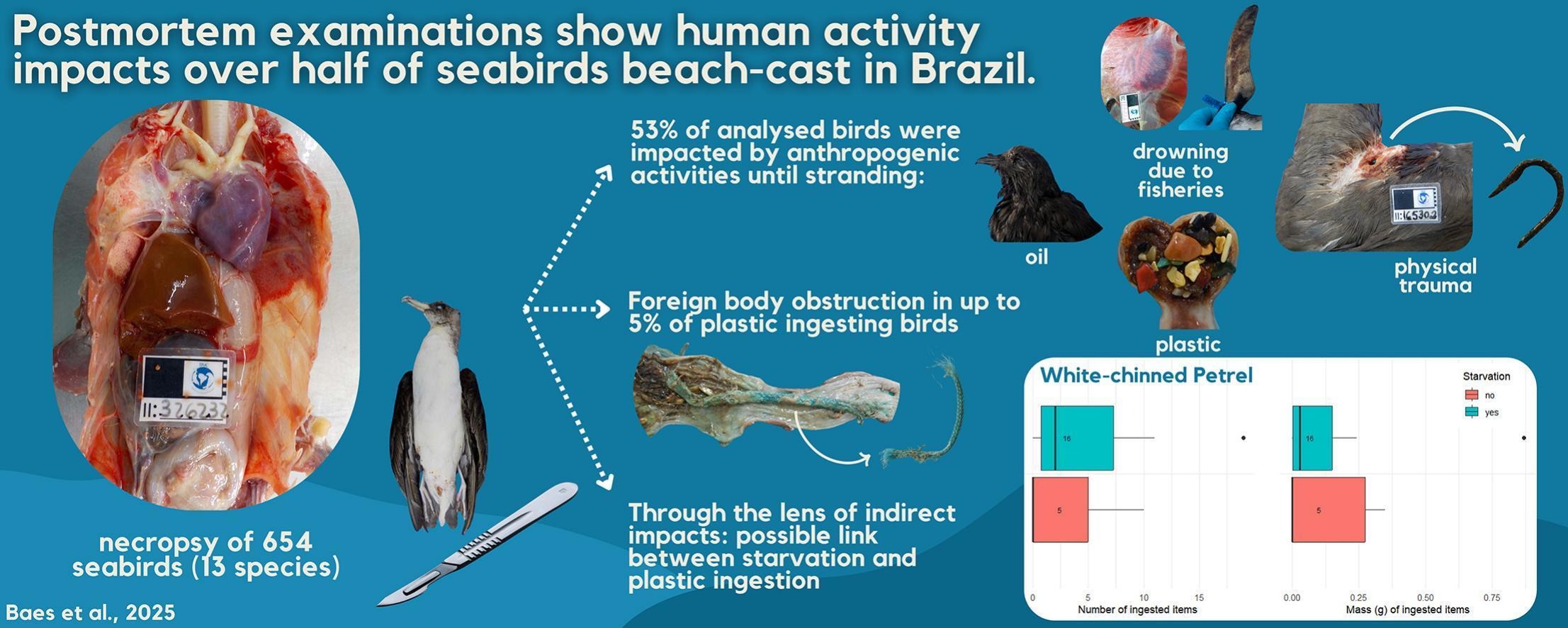
Graphical abstract from the publication
Laura Baes (Programa de Pós=Graduação em Ecologia e Recursos Naturais, Universidade Federal de São Carlos, Brazil) and colleagues have published in the journal Science of the Total Environment showing that anthropogenic activities impacted half of beach-cast collected seabirds in southeastern Brazil, with a possible link between starvation and plastic ingestion. “Within Procellariiformes, most of them are from the family Procellaridae (petrels and shearwaters)”, including ACAP-listed White-chinned Petrels Procellaria aequinoctialis (43) and Southern Giant Petrels Macronectes giganteus (11), and Black-browed Albatrosses Thalassarche melanophris (24).
The paper’s abstract follows:
“The Southern Atlantic Ocean is home to globally significant seabird populations, and off Brazil little is known about health condition in many species. Despite major known threats that these birds face (i.e., bycatch in fisheries, climate change, disease and pollution), plastic ingestion has become an emerging risk to seabirds, of which it is not clear how sublethal effects take part in the health of individuals that wash up along the coastline. Therefore, this study aimed to characterize seabird health of beach-cast seabirds in Brazil to understand how ingested plastic is related to cause of death and other pathologies. We reviewed complete postmortem examination records of 654 seabirds that beached between 2017 and 2021 in Southeastern Brazil. We identified a multitude of causes that lead to the beaching and death of wild seabirds, including natural and anthropogenic causes, and we also found that over half of analyzed seabirds were impacted by anthropogenic activity (fisheries, oil, plastic, and trauma). Fisheries foremost among them have been impacting seabirds in interactive ways, through bycatch, trauma, and by mismanaged associated debris. We found 5 % of birds that ingested plastic had potential debris obstruction in the gastrointestinal tract, and a possible relationship between ingested plastic and starvation either as a cause of death or as a pathological condition. This study highlights that seabird populations that beach in southeastern Brazil are subject to multiple and interacting threats from anthropogenic activities, providing recent data that can serve as baseline for awareness, conservation and public policies in the South Atlantic.”
With thanks to Sandy Bartle.
Reference:
Baes, L., Freitas Pessi, C., Roman, L., d, Chupil, H., dos Santos Costa, P.C. & Reigada, C. 2025. Postmortem examinations show human activity impacts over half of seabirds beach-cast in Brazil. Science of the Total Environment. 973 10.
ohn Cooper, Emeritus Information Officer, Agreement on the Conservation of Albatrosses and Petrels, 01 April 2025

 Español
Español  English
English  Français
Français